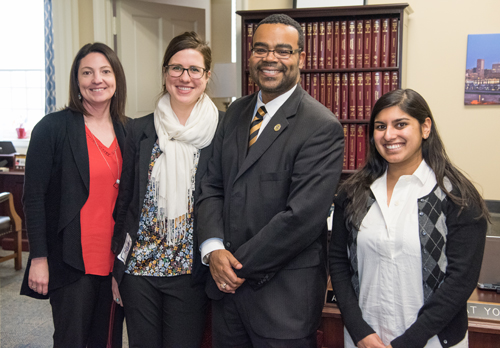Advocating for Team-Based Health Care
As a University of Maryland School of Medicine student shadowing doctors in the pediatric unit at the University of Maryland Medical Center Midtown Campus, Deepanjali Jain knows firsthand that oftentimes patients suffering from chronic illnesses such as asthma and diabetes need more than just medical attention.
"You’ll be looking at somebody’s chart and they’ll have ER [emergency room] admissions for their chronic asthma exacerbations three times over the past two years. Those are preventable things,” Jain told State Delegate Charles E. Sydnor III, JD, a 2000 graduate of the University of Maryland Francis King Carey School of Law, as she and School of Nursing student Elizabeth Beeson and Heather Congdon, PharmD, BCPS, CDE, assistant dean for the University of Maryland School of Pharmacy at the Universities at Shady Grove and co-director of the UMB Center for Interprofessional Education, sat in the lawmaker’s office. “If there are social factors going on, that’s where you’re going to need to pull in social work, law, or nursing,” Jain explained.

From left, Heather Congdon, Elizabeth Beeson, Del. Charles E. Sydnor III, and Deepanjali Jain.
Jain and Beeson were among a group of 16 students representing the University of Maryland, Baltimore’s (UMB) schools of Medicine, Nursing, Social Work, Dentistry, Pharmacy, and Law. They joined UMB President Jay A. Perman, MD, and other faculty members for Interprofessional Education (IPE) Advocacy Day in Annapolis Feb. 21.
(View a photo gallery.)
Other attendees included School of Medicine students Daniel Imas and Kaylie Miller; School of Nursing students Keisha Bates, Khondaker Rifat Bhaskar, and Niya Ross; School of Social Work students Elizabeth Hoey, Sara Rudolph, and Constance Scott; School of Pharmacy students Bahareh Ghorashi, Eli Inscoe, Pamela Younes, and Alexander Joachim; Carey School of Law student Yelitza Conover; and School of Dentistry dental hygiene student Daniel Kwon. They were assisted by Kevin Kelly, JD, chief government affairs officer and associate vice president at UMB, and Melanie Moore, program administrative specialist.
In past years, representatives from each of UMB’s schools traveled to Annapolis on school-specific advocacy days. Each school operated in its own “silo,” said Perman, rather than promoting a multidisciplinary team-based approach to health care.
“We were sending the wrong message,” he told students before they were divided into teams and dispatched to legislative offices. Del. Antonio Hayes, who represents Baltimore, also provided welcoming remarks.
“We have in these United States, a growing population with chronic diseases,” continued Perman, who conducts his own interprofessional education clinic on a weekly basis. “We have … an increasing number of seniors, who have by definition with the aging process, multiple issues. And we have a lot of unfortunate people in this country, some right outside the doors of the campus,” he said. “They don’t need simply a diagnosis and the proper prescription. If you think that because you prescribed the proper therapy you’re done, you’re not done, if you really care about making the patient well. You want to get the job done, you need each other. “
When meeting with legislators, the students and Perman proposed creating a pilot program that may be introduced in the 2018 General Assembly session that would bring team-based health care to an underserved region such as Prince George’s County or Western Maryland, to aid patients suffering from chronic illnesses such as diabetes and asthma. People with chronic diseases are the heaviest users of health care, and when their diseases are not managed well, are the heaviest users of the most expensive health care: emergency and inpatient treatment. Evidence shows that patients with chronic illnesses receiving team-based care make fewer emergency department visits than those receiving traditional care and are hospitalized less frequently.
“I think it’s a great idea, and any way we can help, I will help,” Sen. Ronald Young, representing Washington and Frederick counties, told the students who visited his office, offering his support for a team-based care pilot program.
“Your work is very important,” Sen. Craig Zucker of Montgomery County told another team of students. “I always say you don’t need to be in elected office to be in public service.”
Trying to manage a patient’s medical condition while ignoring social services issues the patient may be experiencing is “putting a Band-Aid on a bullet wound,” said School of Medicine student Imas. “There is only so much you can do in an office visit.”
Often in her clinics, law student Conover said she would see a client who needs help with a legal issue, but also needs additional assistance in other matters.
“I’ll find out that they have a medical issue, too, or a social issue and I’ll need the help of students at the other schools, like the School of Social Work.” she said. “I’ve been seeing that every day and coming here today I see that we’re all here to work together as a team.”



